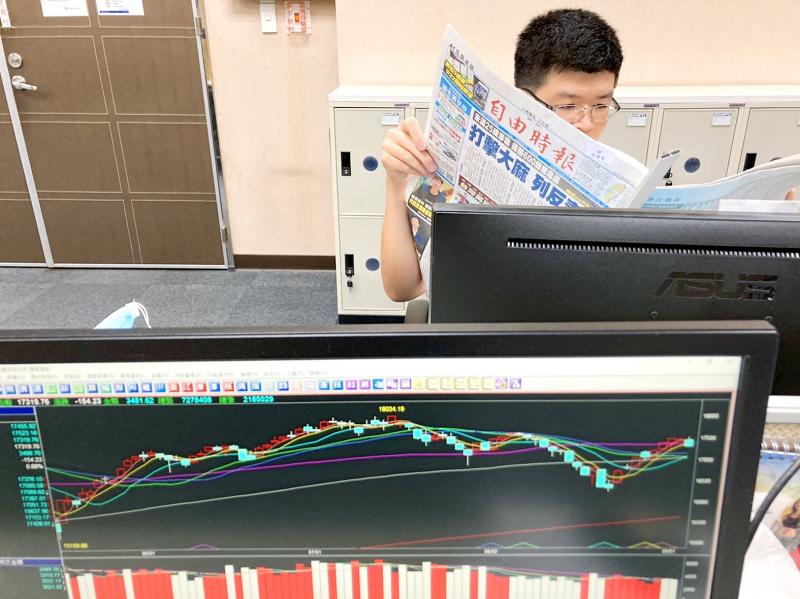The ratio of average daily turnover of day-trading transactions to overall stock market turnover from Friday last week to Thursday fell to 41.3 percent from 47.5 percent in the preceding five trading sessions, as day traders held back following the launch of a new stock warning system, Taiwan Stock Exchange (TWSE) data showed.
Under the new mechanism, which was launched on Thursday last week, the TWSE announces each trading session the names of stocks whose day-trading turnover should not exceed 60 percent of their turnover for the previous six trading sessions, as a way of informing investors which stocks have become overheated.
Although the TWSE describes the new mechanism as “a neutral tool,” saying it would neither boost nor weaken the stock market, day traders in general regard the announcements as a warning about the stocks, with many turning more conservative about them.

Photo: Chen Jou-chen, Taipei Times
Stocks with volatile share prices over the previous six trading days are treated as “disposition securities,” which traders cannot trade on margin nor day trade for 10 days.
If the disposition securities’ day-trading ratio is also higher than 60 percent, the tougher rules would apply to them for up to 12 days, TWSE rules showed.
On the first day the new mechanism took effect, the TWSE announced the names of 12 stocks with a higher-than-60-percent day-trading ratio.
The ratio of day-trading turnover to overall market turnover that day dropped to 44.5 percent from 47.2 percent a day earlier, TWSE data showed.
The gap of about 3 percentage points equates to about a NT$70 billion (US$2.53 billion) reduction in day-trading transactions, the data showed.
The 12 included shipping stocks such as Yang Ming Marine Transport Corp (陽明海運), Wan Hai Lines Ltd (萬海航運) and Shih Wei Navigation Co (四維航業), whose day-trading ratios were 67 percent, 73 percent and 69 percent respectively for the six days prior to Thursday last week, TWSE data showed.
From Monday to yesterday, the TWSE listed fewer than five stocks whose day-trading ratios surpassed 60 percent, while the day-trading turnover continued to retreat, the data showed.
Day-trading turnover totaled NT$211 billion on Monday, which was the lowest since the warning system was launched and less than half of the NT$445 billion recorded on Aug. 2, when the day-trading ratio was 50 percent, the data showed.
Meanwhile, the ratio generally decreased, sliding from 44.5 percent on Thursday last week to 38.3 percent on Monday, 37.3 percent on Tuesday, 41.7 percent on Wednesday and 44.2 percent on Thursday, the data showed.

To many, Tatu City on the outskirts of Nairobi looks like a success. The first city entirely built by a private company to be operational in east Africa, with about 25,000 people living and working there, it accounts for about two-thirds of all foreign investment in Kenya. Its low-tax status has attracted more than 100 businesses including Heineken, coffee brand Dormans, and the biggest call-center and cold-chain transport firms in the region. However, to some local politicians, Tatu City has looked more like a target for extortion. A parade of governors have demanded land worth millions of dollars in exchange

Hong Kong authorities ramped up sales of the local dollar as the greenback’s slide threatened the foreign-exchange peg. The Hong Kong Monetary Authority (HKMA) sold a record HK$60.5 billion (US$7.8 billion) of the city’s currency, according to an alert sent on its Bloomberg page yesterday in Asia, after it tested the upper end of its trading band. That added to the HK$56.1 billion of sales versus the greenback since Friday. The rapid intervention signals efforts from the city’s authorities to limit the local currency’s moves within its HK$7.75 to HK$7.85 per US dollar trading band. Heavy sales of the local dollar by

Taiwan Semiconductor Manufacturing Co’s (TSMC, 台積電) revenue jumped 48 percent last month, underscoring how electronics firms scrambled to acquire essential components before global tariffs took effect. The main chipmaker for Apple Inc and Nvidia Corp reported monthly sales of NT$349.6 billion (US$11.6 billion). That compares with the average analysts’ estimate for a 38 percent rise in second-quarter revenue. US President Donald Trump’s trade war is prompting economists to retool GDP forecasts worldwide, casting doubt over the outlook for everything from iPhone demand to computing and datacenter construction. However, TSMC — a barometer for global tech spending given its central role in the

An Indonesian animated movie is smashing regional box office records and could be set for wider success as it prepares to open beyond the Southeast Asian archipelago’s silver screens. Jumbo — a film based on the adventures of main character, Don, a large orphaned Indonesian boy facing bullying at school — last month became the highest-grossing Southeast Asian animated film, raking in more than US$8 million. Released at the end of March to coincide with the Eid holidays after the Islamic fasting month of Ramadan, the movie has hit 8 million ticket sales, the third-highest in Indonesian cinema history, Film